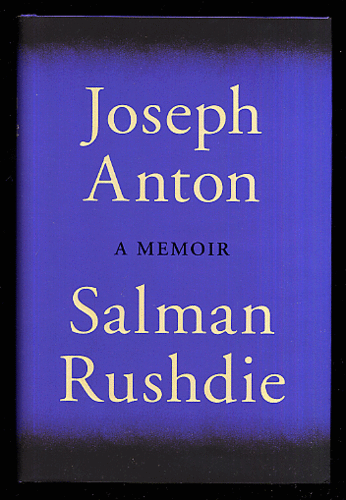
Phew, I got to the end of it. All 633 pages. But first a confession - its the first Salman Rushdie book I have read. I read it for the same reason as most other people will read this autobiographical work - to get the inside version of his years in hiding following the fatwa served on him by the dying ayatollah Khomeini in Iran in 1989 for alleged insult to Islam in his book "Satanic Verses".
The title comes from the name he chose to live under whilst in hiding. Its a composite of the forenames of Joseph Conrad and Anton Chekhov. The early part of the book covers his young life in India, arrival in the UK and his years at public school and university, his parent's unhappy marriage and his estrangement from, and deathbed reconciliation with, his father. I enjoyed this part of the book and found his immersion in all things English at university extremely interesting, but the focus of this story begins with the publication of Satanic Verses in 1988, the subsequent death threat and more than a decade of living in hiding.
He takes us from the early days of living under threat and constant moving from one "safe" house to another through years of living with government security agents in his home and the restrictions placed on him during this long period. He moves through a range of emotions from disbelief and shock, hope and despair, concerns about the safety of his family and those around him to a desire to be free of all security arrangements and to live as he did before the fatwa. He conveys such a feeling of claustrophobia in the middle years of his isolation that I could almost feel it myself.
Joseph Anton also tells the story of the reactions and behaviours of a huge cast of characters involved in or on the edge of this drama. There is both bravery and cowardice in the publishing world with delays in publishing the paperback edition of Satanic Verses due to fear of reprisals - and there were some very real threats - book burning in Bradford, attacks on shops in a range of countries, the Japanese translator stabbed to death and the Danish publisher surviving being shot three times. There were riots in a number of countries, notably India, the country of his birth and where a number of people died during the disturbances - killed by other protestors who almost certainly had neither read the book nor knew who Rushdie actually was. His book was banned in India for several years and he was not allowed to enter the country.
The responses of politicians and the literati to his predicament makes for interesting reading. Keith (now Lord) Vaz, former MP for Leicester called him a few days after the fatwa was served to offer his support, only to address a protesting mob a few weeks later to tell them they had reason to protest the alleged "insult". Political opportunism of the worst kind but no surprise - and he wasn't the only one. The book inadvertently traces the political history of the UK during the last twenty years or so. Thatcher was still Prime Minister when the affair began and we get a glimpse of how other politicians - Hurd, Waldegrave, Major and then Cook and Blair responded to events. Although the Labour government were more helpful, no-one covered themselves in glory and the Iranians were able to give successive governments the run around for a number of years.
Rushdie also gives us a glimpse of the world of the literati and intelligentsia. Whilst a number of its luminaries sprang to his defence and helped him - Susan Sontag, Nigella Lawson, Harold Pinter, Bernard-Henri Levy, Carlos Fuentes and a whole list of others are mentioned in despatches - others were either stand offish or downright unhelpful - John le Carre, Jack Derrida and Arundhati Roy who treated him with contempt and who eventually had her own troubles in India.
I found the book interesting, but I didn't warm to its author. Most of the book is written in the third person, presumably to distance himself from being Joseph Anton and resuming his true identity, but it also distances him from some of the less pleasant aspects of his character. He displays astonishing intolerance for his third wife Elizabeth just after the birth of his second son, Milan as well as constantly criticising the security forces for restricting his movements - sometimes seeming to forget that he is restricted by the supporters of the fatwa and not by those protecting him. Then there is his very one-sided reading of the break-up of his relationships with his wives and the delicious display of jealousy over the departure of the (frankly tedious) Padma for a man even older than him. Despite everything, he managed to go on writing during this period which is something of a feat given the regularly restated death threats against him.
The Rushdie affair was a pre-cursor of what was to come a decade or so later, with the 9/11 attack and subsequent escalation of Islamist activity and attacks on not just the west but anyone not accepting the Islamist world view. We should have learned lessons from what happened to the author about the imperative to stand up to attacks on liberty and values long since hard won including the right to offend. Rushdie ends his book on a note of hope for the "Arab Spring", specifically mentioning Egypt, Tunisia, Libya and Syria and the possibility of a better future. The book was published in early 2012. I wonder what he thinks now.
No comments:
Post a Comment